|
|
|
Sort Order |
|
|
|
Items / Page
|
|
|
|
|
|
|
| Srl | Item |
| 1 |
ID:
183217


|
|
|
|
|
| Summary/Abstract |
This article explores how International Studies as a scientific discipline emerged and developed in China, against the background of a Sinocentric world order that had predominated in East Asia for a long time. The argument of this article is threefold. First, the discipline relied heavily on historical, legal, and political studies, and placed a heavy focus on the investigation of China's integration into the Westphalian system. Second, studies of International Relations were grounded in a problem-solving approach to various issues China was facing at various times in the course of modernisation. Third, the historical development of International Studies in China has had a profound impact on the current IR scholarship in both the PRC and Taiwan, including the recent surge of attempts to establish a Chinese School of IR theory in China and the voluntary acceptance of Western IR in Taiwan. By way of conclusion, the article suggests that there is still an indigenous Chinese site of agency with regards to developing IR. This agency exists despite the fact that in the course of the disciplinary institutionalisation of IR Chinese scholars have largely absorbed Western knowledge.
|
|
|
|
|
|
|
|
|
|
|
|
|
|
|
|
| 2 |
ID:
183219
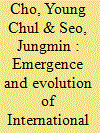

|
|
|
|
|
| Summary/Abstract |
This study investigates how International Relations (IR) as an academic discipline emerged and evolved in South Korea, focusing on the country's peculiar colonial and postcolonial experiences. In the process, it examines why South Korean IR has been so state-centric and positivist (American-centric), while also disclosing the ways in which international history has shaped the current state of IR in South Korea, institutionally and intellectually. It is argued that IR intellectuals in South Korea have largely reflected the political arrangement of their time, rather than demonstrate academic independence or leadership for its government and/or civil society, as they have navigated difficult power structures in world politics. Related to this, it reveals South Korean IR's twisted postcoloniality, which is the absence – or weakness – of non-Western Japanese colonial legacies in its knowledge production/system, while its embracing the West/America as an ideal and better model of modernity for South Korea's security and development. It also reveals that South Korean IR's recent quest for building a Korean School of IR to overcome its Western dependency appears to be in operation within a colonial mentality towards mainstream American IR.
|
|
|
|
|
|
|
|
|
|
|
|
|
|
|
|
| 3 |
ID:
183218


|
|
|
|
|
| Summary/Abstract |
This article aims to contribute to the critical understanding of how International Relations (IR) was built as a social science field within Brazil's modern project. I argue that the foundation and the development of IR in Brazil in the twentieth century is closely associated with foreign policy, on the one hand, and with the national geopolitical thinking, particularly in the aftermath of the Second World War, on the other. In its trajectory, Brazil's IR has been influenced, among others, by the analysis of domestic and systemic determinants of foreign policy, historical interpretations, the study of the components of state power, studies of diplomacy and its contribution to the country's development, the analysis of decision-making processes and to a lesser extent, cognitive approaches. This article is organised around three sections. First, I present a brief history of the geopolitical tradition in Brazil's IR. Second, I discuss IR development in Brazil, stressing the role of diplomats, the key contribution of intellectuals coming from social and human sciences, and finally the emergence of the first generations of IR scholars in the eighties. Third, I analyse the institutionalisation of the field, its quantitative and qualitative growth, presenting some data on its organisation in recent times.
|
|
|
|
|
|
|
|
|
|
|
|
|
|
|
|
| 4 |
ID:
183223
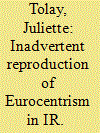

|
|
|
|
|
| Summary/Abstract |
The study of Eurocentrism has become a hallmark of postcolonial International Relations theories. Of particular concern in this literature has been the resilience of Eurocentrism despite conscious efforts to move towards a post-Eurocentric understanding of world politics. This study argues that while existing works have highlighted many of the reasons why Eurocentrism persists today, it has not been sufficiently identified and conceptualised. In particular, why some policy actors, who have a vested interest in moving beyond Eurocentrism, inadvertently reproduce Eurocentrism? This article proposes to distinguish between different types of inadvertent reproductions. In particular it highlights rhetorical critique, deconstruction, decentring and dehierarchising, as different ways to critique, inadvertently reproduce and partially modify Eurocentrism. To illustrate this situation, this article looks at Turkey's migration policies and documents how Turkish governing elites have openly claimed the need to upend the Eurocentric order, yet have reproduced it in practice.
|
|
|
|
|
|
|
|
|
|
|
|
|
|
|
|
| 5 |
ID:
183216
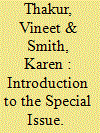

|
|
|
|
|
| Summary/Abstract |
Disciplinary histories are, by default, complicit in the production of subjective memories as truth. This Special Issue builds on the existing scholarship on rethinking IR's disciplinary history by expanding its geographical focus beyond the West, and explores how IR came to define itself as a self-contained body of knowledge that is distinct from other fields of study in different parts of the world. These alternative histories enable us to appreciate that the development of IR as a global discipline was only possible through a transnational circulation of key ideas such as sovereignty, empire, Commonwealth and, especially, competing notions of the ‘international’. In addition, they bring attention to the purpose of knowledge and the politics of its production, and allow for both democratisation as well as discursive plurality.
|
|
|
|
|
|
|
|
|
|
|
|
|
|
|
|
| 6 |
ID:
183221
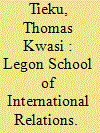

|
|
|
|
|
| Summary/Abstract |
The article explores the Legon School of International Relations (LSIR) which is the research, teaching, and academic programming of International Relations (IR) at the University of Ghana, Legon. The LSIR came out of attempts to decolonise knowledge production, dissemination, and academic programing in Ghana in early 1960s. The article shows that the LSIR is decolonial in theoretical perspective, grounded in southern epistemologies, relational in ontology, qualitative in methodology, practice-based, and it is equity-oriented. Although the LSIR scholarship as a package is distinctive, some of its ideas overlap with the work of several contemporary IR communities in the West. The article highlights implications of the LSIR story for the IR communities in the West and the value of paying close attention to the works of IR centres of scholarship in Africa.
|
|
|
|
|
|
|
|
|
|
|
|
|
|
|
|
| 7 |
ID:
183220
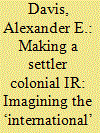

|
|
|
|
|
| Summary/Abstract |
Disciplinary histories of International Relations (IR) in Australia have tended to start with the foundation of an IR chair at the Australian National University (ANU) in 1949. In this article, I trace the discipline's institutional history and traditions of thought from the formation of the Round Table in Australia in 1911, led by Lionel Curtis, through the establishment of the Australian Institute of International Affairs (AIIA), and ending with the ANU story. I argue that Australian IR took as its starting assumption the idea of terra nullius (nobody's land), and the subsequent need to settle Australia. As a result, much of the discussion in the early study of ‘IR’ in Australia was framed around ‘domestic’ matters of settlement and colonisation. The focus of Australian IR radiated outwards from regional capitals, particularly to the tropical and desert regions of Australia with large Indigenous populations. At the margins of this were Australia's colonial possessions in the South Pacific. Finally, Australia's IR looked upon East Asia, motivated at least in part by fears of Asian peoples who might also seek to settle Australia. I conclude with a consideration of what Australian IR's historical entanglements with settler colonialism should mean for the discipline today.
|
|
|
|
|
|
|
|
|
|
|
|
|
|
|
|
| 8 |
ID:
183222


|
|
|
|
|
| Summary/Abstract |
At the height of the Syrian civil war, many observers argued that the Syrian state was collapsing, fragmenting, or dissolving. Yet, it never actually vanished. Revisiting the rising challenges to the Syrian state since 2011 – from internal collapse through external fragmentation to its looming dissolution by the ‘Islamic State’ – provides a rare opportunity to investigate the re-enactment of both statehood and international order in crisis. Indeed, what distinguishes the challenges posed to Syria, and Iraq, from others in the region and beyond is that their potential dissolution was regarded as a threat not merely to a – despised – dictatorial regime, or a particular state, but to the state-based international order itself. Regimes fall and states ‘collapse’ internally or are replaced by new states, but the international order is fundamentally questioned only where the territorially delineated state form is contested by an alternative. The article argues that the Syrian state survived not simply due to its legal sovereignty or foreign regime support, but also because states that backed the rebellion, fearing the vanishing of the Syrian nation-state in a transnational jihadist ‘caliphate’, came to prefer its persistence under Assad. The re-enactment of states and of the international order are thus ultimately linked.
|
|
|
|
|
|
|
|
|
|
|
|
|
|
|
|
| 9 |
ID:
183224


|
|
|
|
|
| Summary/Abstract |
The Dollo Ado refugee camps, located close to the Ethiopian-Somali border, have been a major focus for the United Nations Refugee Agency (UNHCR)'s attempts to build livelihoods for refugees and the host community. The context presents an analytical puzzle: despite the importance of cross-border activity to refugees’ socioeconomic lives, such transnational activity has been institutionally invisible to and hindered by the international agencies seeking to assist them. The article explores how and why refugees’ cross-border activities have been systematically ignored by international institutions. As a theoretical starting point, it draws upon the post-development literature, and notably the work of James Ferguson, which explores how international institutions frequently misunderstand the agency and strategies of their subject populations. However, contra Ferguson's predominantly Foucauldian methodological and epistemologically approach, the article adopts a mixed methods approach, and emphasises the agency of aid workers, bureaucratic politics, and political economy in its account of the disjuncture between international institutions’ state-centric livelihoods programmes and refugees’ own cross-border economic strategies.
|
|
|
|
|
|
|
|
|
|
|
|
|
|
|
|
|
|
|
|
|